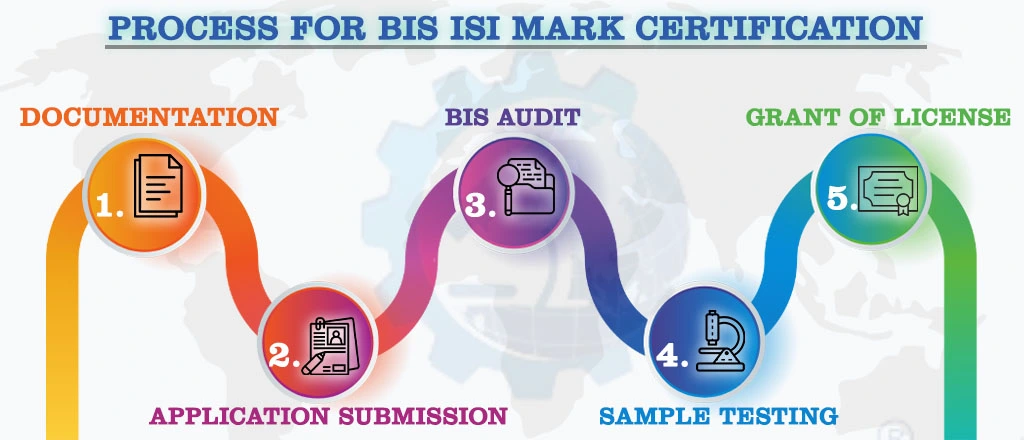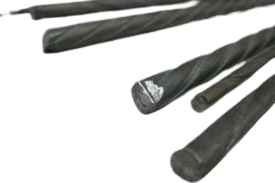Plain Hard-drawn Steel Wire For Pre-stressed Concrete Part 1 Cold Drawn Stress-relieved Wire IS 1785 (Part-1):1983
Plain hard-drawn steel wire for prestressed concrete, specifically Part 1 Cold Drawn Stress-relieved Wires, is essential in construction applications requiring high-strength reinforcement. These wires are used in the production of prestressed concrete, where the steel wires are tensioned before the concrete is poured, and upon releasing the tension, the wires exert a compressive force on the concrete. This process significantly enhances the concrete's structural capacity, making it more resistant to cracking and increasing its durability and load-bearing capabilities. Cold drawn and stress-relieved, these wires offer superior tensile strength and stability, ensuring long-term performance and reliability in various infrastructure projects such as bridges, buildings, and highways.
Importance of BIS Certification
BIS certification is necessary for Plain Hard-drawn Steel Wire for Prestressed Concrete: Part 1 Cold Drawn Stress-relieved Wires to ensure they meet the stringent quality and safety standards set by the Bureau of Indian Standards. This certification guarantees that the wires possess the required tensile strength, durability, and stability essential for their role in prestressed concrete applications. By adhering to BIS standards, manufacturers can ensure the wires' reliability and performance, thereby enhancing the safety and longevity of infrastructure projects such as bridges and buildings, while also fostering consumer trust and regulatory compliance.
Indian Standard IS 1785 (Part-1):1983
As per the latest Quality Control Order (QCO) from the Ministry of Steel, Government of India, Plain Hard-drawn Steel Wire for Prestressed Concrete: Part 1 Cold Drawn Stress-relieved Wires must adhere to the Indian Standard IS 1785 (Part-1):1983. This standard ensures that these wires meet essential quality and safety criteria, including the required tensile strength, durability, and stability for their use in prestressed concrete applications. Compliance with IS 1785 (Part-1):1983 guarantees that the wires are manufactured to precise specifications, ensuring their reliability and performance in critical infrastructure projects, thereby aligning with regulatory guidelines and fostering consumer trust in the quality and safety of construction materials.
Key highlights
| Product Name | Plain Hard-drawn Steel Wire for Prestressed Concrete: Part 1 Cold Drawn Stress-relieved Wire. |
| Applicable Indian Standard | IS 1785 (Part-1):1983 |
| Applicable Certification Scheme | Product Certification Scheme (ISI Mark Scheme) Scheme 1 - Schedule 2 |
| Compliance Requirement | Mandatory |
| QCO Link | Plain Hard-drawn Steel Wire For Pre-stressed Concrete Part 1 Cold Drawn Stress-relieved Wire |
| Scope as per Standard | This standard (Part I) covers the requirements for the manufacture, supply and testing of plain, cold drawn, stress-relieved steel wire for use in prestressed concrete. |
Tests
The following are the major tests for Textiles - Polypropylene (PP) Woven, Laminated, Block Bottom Valve Sacks for Packaging of 50 kg Cement.
- Nominal Size, Ovality and tolerance
- Nominal mass
- Tensile Strength
- Proof stress
- Ductility
- Elongation after fracture

NOTE:
For Detailed Information about the Procedure for BIS ISI Certification, Visit :
Timeline for BIS Certification
The approximate timeline to obtain BIS certification for Plain Hard-drawn Steel Wire for Prestressed Concrete: Part 1 Cold Drawn Stress-relieved Wires to use the ISI mark as per IS 1785 (Part-1):1983 is as follows:
- For Indian Manufacturers (Standard Timeframe – 30 days)
- For Foreign Manufacturers (Standard Timeframe – 180 days)
Conclusion:
Ensuring the quality and reliability of Plain Hard-drawn Steel Wire for Prestressed Concrete: Part 1 Cold Drawn Stress-relieved Wires is crucial for the integrity of infrastructure projects. BIS certification according to Indian Standard IS 1785 (Part-1):1983 guarantees that these wires meet essential quality and safety standards, providing the necessary tensile strength, durability, and stability for their critical role in construction. By adhering to these standards, manufacturers can deliver high-quality products that enhance the safety, longevity, and performance of bridges, buildings, and other key infrastructure, thereby fostering consumer trust and compliance with regulatory requirements.
For more updates and detailed procedures, stay connected with Aleph INDIA and ensure your products are always compliant and top-quality.
International Audits & Participation
Testimonials
BIS REGISTRATION FOR ELECTRONIC & IT PRODUCT
In the era of globalization, world trade is growing rapidly and henceforth, Manufacturing and Import/Export businesses are also growing drastically...View More
BIS CERTIFICATE FOR FOREIGN MANUFACTURER
The Economy of India-the fastest developing economy on the globe with the capabilities that help it matches up with the biggest international...View More
PRODUCT CERTIFICATION SCHEME (ISI MARK) FOR DOMESTIC MANUFACTURERS
Anything a person buys from food to cars, clothes to electronics, branded to unnamed products there is always a question that wanders in one’s...View More
WIRELESS PLANNING AND COORDINATION (WPC)
WPC: Wireless means communication done from one point to another point without the wires and cables. Electromagnetic waves carry the ...View More
BUREAU OF ENERGY EFFICIENCY (BEE) CERTIFICATE
BEE CERTIFICATE: Energy is the future, and its conservation is the way of the bright future. Everyone claims the environment is important...View More
E-WASTE MANAGEMENT
E-waste is one of the world's fastest-growing trash streams. We currently manufacture almost 50 million tones of it each year...View More
View All Services
Request a call back.
Would you like to speak to one of our Senior Technical advisers over the phone? Just submit your details and we’ll be in touch shortly. You can also email us if you would prefer.






























